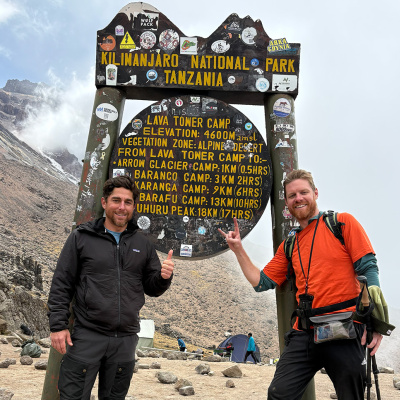FBI Director James Comey Talks National Security at UT

When FBI Director James Comey walked through the large double doors of the Etter-Harbin Alumni Center this morning, trailing UT-Austin President Greg Fenves and UT System Chancellor Adm. Bill McRaven and flanked by security, the entire room snapped to attention.
For the almost two hours before his arrival, men and women in blazers sipped coffee and tea at circular tables that fanned out across the ballroom, while students sat in reserved rows of seats near the back, munching on breakfast. Numerous uniformed law enforcement and military, plus men in suits donning clear earpieces dotted the room, eyes darting back-and-forth. A dozen camera operators perched atop a low riser, their lenses trained on a podium anticipating an occupant who has, since November's election, become a household name.
Thursday morning at the Intelligence in Defense of the Homeland, a symposium hosted by the Clements-Strauss Intelligence Studies Project and the Business Executives for National Security, had a full slate of speakers to discuss national security with the UT community throughout the day. But none were as anticipated as Comey, seen by many as one of the most divisive and newsworthy figures in the U.S. government.
At 10:30 a.m., McRaven introduced Comey, mentioning some highlights of his career, including his role in prosecuting the Gambino crime family and Martha Stewart before offering some effusive praise. In the words of the admiral, Comey is not, at least among his peers at the FBI, the least bit divisive.
"What you need to know is that James Comey is a good man," McRaven said, his voice booming. "He is a man worthy of our deepest respect. He is universally loved and respected by the men and women of the FBI. As a nation, we are blessed to have him as director of the FBI."
Comey took the podium for his keynote address and immediately deadpanned, "It's all downhill after that, by the way."
The FBI director then outlined the agency's top priority: counterterrorism, specifically regarding ISIS and the ways in which the caliphate recruits new members. The internet is a key tool for Islamic terrorist groups in finding new members, but they haven't yet used it to directly attack the U.S.
"Every threat that comes at the FBI today comes through the internet—all of it has a digital aspect to it," Comey said. "The one that doesn't is the terrorist threat. They use is to proselytize, to communicate, but they have not yet turned to harm us through the digital vector. Logic tells us that is a threat we will face."
During a brief back-and-forth between Comey and Clements Center Director and LBJ School professor William Inboden, the conversation evolved to what the FBI director feels is a clash between public safety on one side and privacy and innovation on the other. He mentioned that of 2,800 devices the FBI had recently collected, 43 percent could not be opened even using classified techniques.
"The default has become darkness," Comey said. "It's spreading throughout the whole room."
He continued, "The bad guys have made the world tiny. Belarus and Boston are next door to each other on the internet. I'm not picking on Belarus, I just needed a B."
Throughout the speech, which did not contain much tension and was not visibly protested, Comey played up his relatability. He received quite a few laughs as he used colloquialisms like "knuckleheads" and "creeps" to describe terrorists, and even uttered the phrase "smoking weed" once. He described his restricted Instagram account as one with only nine followers—eight family members and a daughter's boyfriend—to convey his positivity toward encryption and privacy in the daily lives of Americans.
Describing the uniformity of FBI members, he said, "We want to go to the fight with everybody owning the mission. It is a joint world inside the FBI. We're training the kids to be that way, to work out together, to drink beer together—which we don't do enough, by the way."
He touched on the FBI's persistence to track down criminals by invoking a 45-year-old hijacking cold case.
"Hacking is done thoughtfully. If people are afraid of us, they will change their behavior. We are dogged people," Comey said. "We just gave up on D.B. Cooper."
Near the end, he thanked the audience, and the American public writ large, for taking him to task, mentioning that it doesn't benefit our society if he "falls in love with his own virtues."
The subject that propelled Comey into the national conversation is the only one he would not touch. One student asked about the investigation into the possible collusion between the Trump campaign and Russia during the 2016 presidential election. On Monday, Comey spent hours answering questions about Russia's attempts to influence the election in front of the House Permanent Select Committee on Intelligence, but he quickly shut this one down.
"I'm not going to talk about it," he said. "If you didn't get enough of me on Monday ..."
Photo of James Comey in September 2016 via Flickr






